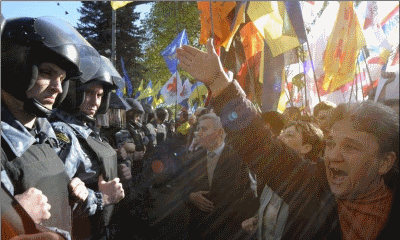Update: Meanwhile in France today, Yanukovych denies the Holodomor of genocide to Europe.
From the New York Times:
Ukrainian Parliament on Tuesday narrowly approved an agreement to allow Russia to extend a lease on a naval base on Ukrainian territory.
Opponents, who maintained that the deal would infringe on Ukrainian sovereignty, jeered loudly inside the legislative chamber in Kiev, set off smoke bombs and threw eggs at the parliamentary speaker, Volodymyr M. Lytvyn. His aides tried to protect him by holding umbrellas around him.
…
“This is a black page in the history of our government,†said Yulia V. Tymoshenko, a former prime minister who is now the opposition leader.
Ukrainian politics are contentious, but even so, Tuesday’s vote was unusually unruly, offering a glimpse at the depth of feelings toward Russia.
Ukraine in recent years has turned into flashpoint in the struggle between the West and Russia for influence in the former Soviet Union. And for many Ukrainians, the Russian naval base has been a primary symbol, for better or worse, of the Russian role in the country.
…
Mr. Yanukovich has long had close ties to the Kremlin, in part because he is from the Russian-speaking region of eastern Ukraine. Last week, he reached an arrangement with his Russian counterpart, Dmitri A. Medvedev, to extend the lease for another 25 years in return for a 30-percent reduction in the cost of Russian natural gas.
But was the vote rigged to begin with?
The opposition – led on the streets by ex-Prime Minister Yulia Tymoshenko and inside by 150 deputies of her bloc — called parliament’s vote rigged. They tried in vain to physically stop the vote by covering their desks with the Ukrainian flag. Some deputies tossed a hail of raw eggs at the speaker, who sat at the rostrum protected by two bodyguards who shielded Lytvyn under two black umbrellas.
The vote is suspect since only 211 lawmakers, 15 less than the majority required to ratify the vote, registered for the session. A dozen new Party of Regions deputies were sworn in before the crucial vote. All deputies belonging to the ruling coalition — Party of Regions, Communist Party and Volodymyr Lytvyn bloc — supported the measure, along with 13 non-aligned deputies.
Tymoshenko vowed to unite the democratic opposition in nationwide protests culminating in a major event on May 11, when parliament reconvenes.
…
Tymoshenko bloc deputy Volodymyr Polokhalo said Party of Regions deputies occupied the chamber by force and voted from the seats of deputies from the Our Ukraine opposition. “After the second smoke bomb went off, they barged into the Our Ukraine sector and used the cards of the deputies who defected from the faction in order to pass the vote,†Polokhalo said.
The Financial Times also chimed on what extending the Black Sea Fleet means for Ukraine:
By allowing the Russian navy to extend the lease over its base at Sevastopol in the Crimea, he has effectively torpedoed Ukraine’s pursuit of Nato membership. The alliance’s rules prohibit any member nation from hosting foreign bases on its soil.
Here’s a video of people rallying outside the Rada from Ukrainiana:
And here’s one of demonstrators in parliament, is this government really ‘democracy in action’ by the will of the people?
Vladimir Putin was quoted on the deal:
“Military co-operation, without a doubt, increases trust between two countries, gives us an opportunity to do work full of trust in the economic and social and political spheres,”
Scratch another one off the master plan to undo the Orange Revolution:
- Gas Prices Deal for Russian clout
- Extending Russia’s Black Sea Fleet in Ukraine’s Sevastopol
- Cancelling honours of Heroes of Ukraine
- Economic alignment with former Bloc countries (ie. reforming the USSR) -Â getting there
- Russian language in Ukraine (a resurgence of a century long campaign of de-Ukrainianzation) Â -Â getting there
- Holodomor denial
This is the new face of Yanukovych’s Ukraine:

 During the evening of April 26, 1986 – 24 years ago – there was an explosion at one of the reactors of the Chornobyl Nuclear Plant in Ukraine, a fact now well known throughout the world.However, even today we do not have a complete understanding or information about the consequences of this disaster then and its ongoing ramifications because the Soviet Union took on a major cover-up of this nuclear explosion.
During the evening of April 26, 1986 – 24 years ago – there was an explosion at one of the reactors of the Chornobyl Nuclear Plant in Ukraine, a fact now well known throughout the world.However, even today we do not have a complete understanding or information about the consequences of this disaster then and its ongoing ramifications because the Soviet Union took on a major cover-up of this nuclear explosion.
 Mr. Yanukovych has committed a series of mistakes that could doom his presidency, scare off foreign investors, and thwart the country’s modernization.
Mr. Yanukovych has committed a series of mistakes that could doom his presidency, scare off foreign investors, and thwart the country’s modernization.